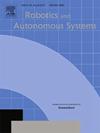LLM-controller: Dynamic robot control adaptation using large language models
IF 4.3
2区 计算机科学
Q1 AUTOMATION & CONTROL SYSTEMS
引用次数: 0
Abstract
In this study, a dynamic adaptation of a robot controller is investigated using large language models (LLMs). We propose our controller called the LLM-Controller, where, in response to changes in the system dynamics or reference signals, the LLM adapts the controller to the new context. Various scenarios reflecting real-world conditions, including unknown disturbances, unmodeled dynamics, and changing reference signals, were analyzed. Using the proposed LLM-Controller, one can adapt to new conditions automatically without manual tuning. Additionally, the controller's performance is investigated using different prompting techniques, such as zero-shot and few-shot chain-of-thought (COT), which facilitate step-by-step reasoning and improve adaptation to new contexts. The proposed scheme is applied to two case studies involving robot manipulators. First, it is tested on a 2-link robot manipulator, followed by a 3-link manipulator to enhance its generalizability. The algorithm's adaptability and effectiveness are further evaluated across a range of tasks and conditions, demonstrating its versatility in various scenarios. The results demonstrate that the LLM-Controller achieved a 100 % success rate in adapting the controller to new conditions for the 2-link manipulator, with a significant improvement in trial efficiency; while for the 3-link system, the controller maintained a 90 % success rate, showing greater adaptability to changes in reference signals or dynamic conditions in under 20 s. These outcomes could be further enhanced by employing a COT approach, potentially leading to higher success rates, fewer trials, and optimized costs. In contrast, the classic nonlinear adaptive controller struggled to adjust to the new conditions, while the LLM-Controller automatically adapts, guiding the system to new stable states. This research provides valuable insights into how LLMs can enhance decision-making, improving stability and performance in dynamic and uncertain environments.
求助全文
约1分钟内获得全文
求助全文
来源期刊

Robotics and Autonomous Systems
工程技术-机器人学
CiteScore
9.00
自引率
7.00%
发文量
164
审稿时长
4.5 months
期刊介绍:
Robotics and Autonomous Systems will carry articles describing fundamental developments in the field of robotics, with special emphasis on autonomous systems. An important goal of this journal is to extend the state of the art in both symbolic and sensory based robot control and learning in the context of autonomous systems.
Robotics and Autonomous Systems will carry articles on the theoretical, computational and experimental aspects of autonomous systems, or modules of such systems.
 求助内容:
求助内容: 应助结果提醒方式:
应助结果提醒方式:


